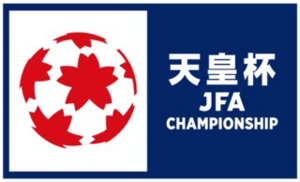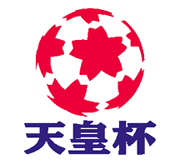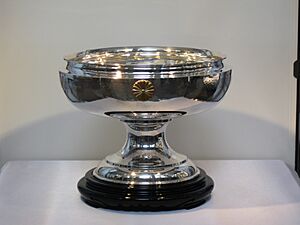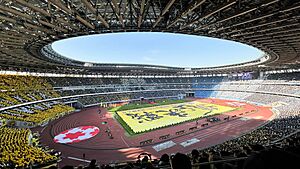Emperor's Cup facts for kids
 |
|
| Founded | 1921 |
|---|---|
| Region | Japan |
| Number of teams | 88 |
| Qualifier for | AFC Champions League Elite |
| Current champions | Vissel Kobe (2nd title) |
| Most successful club(s) | Urawa Red Diamonds Keio BRB (8 titles each) |
| Television broadcasters | NHK (live matches and highlights) |
The Emperor's Cup JFA All-Japan Football Championship Tournament (Japanese: 天皇杯 JFA 全日本サッカー選手権大会, Hepburn: Tennōhai Jēefuē Zen-Nihon Sakkā Senshuken Taikai), often called The Emperor's Cup (Japanese: 天皇杯, サッカー天皇杯, Hepburn: Tennōhai, Sakkā Tennōhai), is a big annual football competition in Japan. It is the oldest football tournament in the country. It started way back in 1921.
This tournament has been around longer than the J.League, which is Japan's professional football league. Before World War II, teams from Japanese colonies like Korea and Taiwan could also join. The team that wins the Emperor's Cup gets to play in the AFC Champions League, a major Asian club tournament. The women's version of this cup is called the Empress's Cup.
Vissel Kobe is the current champion. They won their second title in the 2024 Emperor's Cup tournament. They also won in 2019.
Contents
What is the Emperor's Cup?
The Emperor's Cup aims to find the "best soccer club in Japan." Any football club that is a member of the Japan Football Association can enter. This includes teams from the top professional leagues (J1 and J2). It also includes teams from lower leagues like J3, JFL, regional leagues, and even top college and high school teams.
The winning team gets to wear a special Yatagarasu emblem. This emblem is a symbol of victory. Winning the cup also earns them a spot in the AFC Champions League for the next season.
Since the J.League started in 1992, professional teams usually win. However, the Emperor's Cup is a knockout tournament. This means that "giant-killers" from amateur teams can sometimes surprise and beat a top J.League team. For example, in 2003/04, a high school team almost beat the J.League champions in a penalty shootout.
The final match of the Emperor's Cup has traditionally been played on New Year's Day. It was usually held at the National Stadium in Tokyo. This match is seen as the official end of the football season. However, since 2014, the final has been held at different stadiums. This was due to the National Stadium being rebuilt for the 2020 Summer Olympics. The 2014 Emperor's Cup Final was held in December 2014. The 2018 Emperor's Cup Final was also held in December 2018.
On January 1, 2020, Vissel Kobe won their first-ever title. They beat Kashima Antlers in the 2019 Emperor's Cup Final. This game was played at the new National Stadium. It was also the first professional football match in Japan to use video assistant referee (VAR) technology.
How the Tournament Works
The first matches for the Emperor's Cup usually start between April and August each year. The 104th Emperor's Cup (2024) was played from May 25, 2024, to November 23, 2024.
The main knockout part of the competition begins later in the year. All teams from J1 League and J2 League automatically enter the second round. The winners from each of Japan's 47 prefectural championships also join. These prefectural winners can be professional or amateur teams. One special amateur team, often the JFL champion, also gets a spot. These 48 teams start in the first round.
J1 and J2 teams usually get a "bye" in the first round. This means they don't have to play in the first round. They automatically start in the second round. Higher-ranked teams also get to play their early matches at home. However, from the third round onwards, they lose this home advantage.
Over the years, the rules for which teams enter have changed. In the past, only top league clubs and university teams joined. Now, it's open to many more teams across Japan.
The Emperor's Cup Trophy
The very first trophy for the All Japan Championship Tournament was given to the JFA by the English Football Association in 1919. This trophy was used until 1945. Sadly, during World War II, the government took it and melted it down for metal.
When the tournament started again, a new trophy was made. This new trophy has the Imperial chrysanthemum seal on it. In 2011, the English FA gave Japan a copy of the original trophy. This was a symbol of peace and friendship.
Playing in the AFC Champions League
Since the 2001 Emperor's Cup tournament, the winner of the Emperor's Cup gets to play in the AFC Champions League (ACL). This is a big competition for top clubs in Asia. Before the ACL, the cup winner played in the Asian Cup Winners' Cup. To play in the ACL, the winning team must also have a special club license.
Starting from the 2024–25 season, the Emperor's Cup champion will qualify for a new top-tier tournament called the AFC Champions League Elite. They will go straight into the group stage of this tournament.
If the Emperor's Cup winner has already qualified for the AFC Champions League by doing well in the J1 League, then the ACL spot goes to the fourth-placed team in the J1 League.
Past Winners of the Emperor's Cup
This table shows the winners and runners-up of the Emperor's Cup finals. Teams in bold won both the Emperor's Cup and the league title in the same year. Teams in italics were not in the top professional league at the time (after 1965).
| Year | Winners | Score | Runners-up | Final venue | Number of entrants |
|---|---|---|---|---|---|
| 1921 | Tokyo Shukyu-dan | 1–0 | Mikage Shukyu-dan (Kobe) | Hibiya Park | 4 |
| 1922 | Nagoya Shukyu-dan | 1–0 | Hiroshima Koto-shihan | Toshima-shihan Ground | 4 |
| 1923 | Astra Club (Tokyo) | 2–1 | Nagoya Shukyu-dan | Tokyo Koto-shihan Ground | 4 |
| 1924 | Rijo Shukyu Football Club (Hiroshima) | 1–0 | All Mikage Shihan Club (Kobe) | Meiji Jingu Stadium | 4 |
| 1925 | Rijo Shukyu Football Club (Hiroshima) | 3–0 | Imperial University of Tokyo | Meiji Jingu Stadium | 6 |
| 1926 | Cancelled due to the death of Emperor Taishō | ||||
| 1927 | Kobe-Ichi Junior High School Club | 2–0 | Rijo Shukyu Football Club (Hiroshima) | Meiji Jingu Stadium | 8 |
| 1928 | Waseda University WMW | 6–1 | Imperial University of Kyoto | Meiji Jingu Stadium | 7 |
| 1929 | Kwangaku Club | 3–0 | Hosei University | Meiji Jingu Stadium | 8 |
| 1930 | Kwangaku Club | 3–0 | Keio BRB | Koshien-minami Ground | 4 |
| 1931 | Imperial Univ. of Tokyo LB | 3–0 | Kobun Junior High School (Taiwan) | Meiji Jingu Stadium | 7 |
| 1932 | Keio Club | 5–1 | Yoshino Club (Nagoya) | Koshien-minami Ground | 3 |
| 1933 | Tokyo Old Boys Club | 4–1 | Sendai Soccer Club | Meiji Jingu Stadium | 8 |
| 1934 | No tournament due to the Far Eastern Championship Games | ||||
| 1935 | Kyungsung FC | 6–1 | Tokyo Bunri University | Meiji Jingu Stadium | 6 |
| 1936 | Keio BRB | 3–2 | Bosung College (Seoul) | Army Toyama Ground | 5 |
| 1937 | Keio University | 3–0 | Kobe University of Commerce | Meiji Jingu Stadium | 4 |
| 1938 | Waseda University | 4–1 | Keio University | Meiji Jingu Stadium | 5 |
| 1939 | Keio BRB | 3–2 | Waseda University | Meiji Jingu Stadium | 8 |
| 1940 | Keio BRB | 1–0 | Waseda University WMW | Meiji Jingu Stadium | 8 |
| 1941–45 | Suspended during World War II | ||||
| 1946 | University of Tokyo LB | 3–2 | Kobe University of Economics | Tokyo Imperial Univ. Gotenshita Stadium | 12 |
| 1947–48 | Cancelled due to post-World War II unrest | ||||
| 1949 | University of Tokyo LB | 3–2 | Kandai Club | Waseda Univ. Higashifushimi Ground | 5 |
| 1950 | All Kwangaku | 6–1 | Keio University | Kariya City Stadium | 16 |
| 1951 | Keio BRB | 3–2 | Osaka Club | Miyagino Soccer Stadium (Sendai) | 14 |
| 1952 | All Keio | 6–2 | Osaka Club | Fujieda Higashi High School | 16 |
| 1953 | All Kwangaku | 5–4 (aet) | Osaka Club | Nishikyogoku Stadium | 16 |
| 1954 | Keio BRB | 5–3 | Toyo Industries | Yamanashi Prefectural Stadium (Kofu) | 16 |
| 1955 | All Kwangaku | 4–2 | Chuo University Club | Nishinomiya Stadium | 16 |
| 1956 | Keio BRB | 4–2 | Yawata Steel | Omiya Athletic Stadium | 16 |
| 1957 | Chuo University Club | 1–0 | Toyo Industries | Kokutaiji High School (Hiroshima) | 16 |
| 1958 | Kwangaku Club | 1–0 | Yawata Steel | Fujieda Higashi High School | 16 |
| 1959 | Kwangaku Club | 1–0 | Chuo University | koishikawa Football Stadium | 16 |
| 1960 | Furukawa Electric | 4–0 | Keio BRB | Osaka Utsubo Soccer Stadium | 16 |
| 1961 | Furukawa Electric | 3–2 | Chuo University | Fujieda Higashi High School | 16 |
| 1962 | Chuo University | 2–1 | Furukawa Electric | Kyoto Nishikyogoku Stadium | 16 |
| 1963 | Waseda University | 2–1 | Hitachi | Kobe Oji Stadium | 7 |
| 1964 | Yawata Steel Furukawa Electric |
0–0 (aet) | none (title shared) | Kobe Oji Stadium | 10 |
| 1965 | Toyo Industries | 3–2 | Yawata Steel | Tokyo Komazawa Stadium | 8 |
| 1966 | Waseda University | 3–2 (aet) | Toyo Industries | Tokyo Komazawa Stadium | 8 |
| 1967 | Toyo Industries | 1–0 | Mitsubishi Heavy Industries | Tokyo National Stadium | 8 |
| 1968 | Yanmar Diesel | 1–0 | Mitsubishi Heavy Industries | Tokyo National Stadium | 8 |
| 1969 | Toyo Industries | 4–1 | Rikkyo University | Tokyo National Stadium | 8 |
| 1970 | Yanmar Diesel | 2–1 (aet) | Toyo Industries | Tokyo National Stadium | 8 |
| 1971 | Mitsubishi Heavy Industries | 3–1 | Yanmar Diesel | Tokyo National Stadium | 8 |
| 1972 | Hitachi | 2–1 | Yanmar Diesel | Tokyo National Stadium | 75 |
| 1973 | Mitsubishi Heavy Industries | 2–1 | Hitachi | Tokyo National Stadium | 807 |
| 1974 | Yanmar Diesel | 2–1 | Eidai Industries | Tokyo National Stadium | 1,105 |
| 1975 | Hitachi | 2–0 | Fujita Industries | Tokyo National Stadium | 1,298 |
| 1976 | Furukawa Electric | 4–1 | Yanmar Diesel | Tokyo National Stadium | 1,358 |
| 1977 | Fujita Industries | 4–1 | Yanmar Diesel | Tokyo National Stadium | 1,421 |
| 1978 | Mitsubishi Heavy Industries | 1–0 | Toyo Industries | Tokyo National Stadium | 1,481 |
| 1979 | Fujita Industries | 2–1 | Mitsubishi Heavy Industries | Tokyo National Stadium | 1,494 |
| 1980 | Mitsubishi Heavy Industries | 1–0 | Tanabe Pharmaceutical | Tokyo National Stadium | 1,474 |
| 1981 | Nippon Kokan | 2–0 | Yomiuri FC | Tokyo National Stadium | 1,569 |
| 1982 | Yamaha Motor Company | 0–0 (1–0 replay) |
Fujita Industries | Tokyo National Stadium | 1,567 |
| 1983 | Nissan Motor Company | 2–0 | Yanmar Diesel | Tokyo National Stadium | 1,565 |
| 1984 | Yomiuri FC | 2–0 | Furukawa Electric | Tokyo National Stadium | 1,476 |
| 1985 | Nissan Motor Company | 2–0 | Fujita Industries | Tokyo National Stadium | 1,498 |
| 1986 | Yomiuri FC | 2–1 | Nippon Kokan | Tokyo National Stadium | 1,612 |
| 1987 | Yomiuri FC | 2–0 | Mazda Soccer Club | Tokyo National Stadium | 1,690 |
| 1988 | Nissan Motor Company | 3–2 (aet) | Fujita Industries | Tokyo National Stadium | 1,786 |
| 1989 | Nissan Motor Company | 3–2 | Yamaha Motor Company | Tokyo National Stadium | 1,737 |
| 1990 | Matsushita Electric Industrial | 0–0 (4–3 p) | Nissan Motor Company | Tokyo National Stadium | 1,776 |
| 1991 | Nissan Motor Company | 4–2 (aet) | Yomiuri FC | Tokyo National Stadium | 1,872 |
| 1992 | Yokohama Marinos | 2–1 (aet) | Verdy Kawasaki | Tokyo National Stadium | 2,452 |
| 1993 | Yokohama Flügels | 6–2 (aet) | Kashima Antlers | Tokyo National Stadium | 2,511 |
| 1994 | Bellmare Hiratsuka | 2–0 | Cerezo Osaka | Tokyo National Stadium | 2,792 |
| 1995 | Nagoya Grampus Eight | 3–0 | Sanfrecce Hiroshima | Tokyo National Stadium | 2,800 |
| 1996 | Verdy Kawasaki | 3–0 | Sanfrecce Hiroshima | Tokyo National Stadium | (unknown) |
| 1997 | Kashima Antlers | 3–0 | Yokohama Flügels | Tokyo National Stadium | 6,107 |
| 1998 | Yokohama Flügels | 2–1 | Shimizu S-Pulse | Tokyo National Stadium | 6,317 |
| 1999 | Nagoya Grampus Eight | 2–0 | Sanfrecce Hiroshima | Tokyo National Stadium | 6,516 |
| 2000 | Kashima Antlers | 3–2 (aet) | Shimizu S-Pulse | Tokyo National Stadium | 6,578 |
| 2001 | Shimizu S-Pulse | 3–2 | Cerezo Osaka | Tokyo National Stadium | 6,306 |
| 2002 | Kyoto Purple Sanga | 2–1 | Kashima Antlers | Tokyo National Stadium | 6,418 |
| 2003 | Júbilo Iwata | 1–0 | Cerezo Osaka | Tokyo National Stadium | 6,849 |
| 2004 | Tokyo Verdy 1969 | 2–1 | Júbilo Iwata | Tokyo National Stadium | 6,685 |
| 2005 | Urawa Red Diamonds | 2–1 | Shimizu S-Pulse | Tokyo National Stadium | 5,918 |
| 2006 | Urawa Red Diamonds | 1–0 | Gamba Osaka | Tokyo National Stadium | 6,390 |
| 2007 | Kashima Antlers | 2–0 | Sanfrecce Hiroshima | Tokyo National Stadium | 6,161 |
| 2008 | Gamba Osaka | 1–0 (aet) | Kashiwa Reysol | Tokyo National Stadium | 5,948 |
| 2009 | Gamba Osaka | 4–1 | Nagoya Grampus | Tokyo National Stadium | (unknown) |
| 2010 | Kashima Antlers | 2–1 | Shimizu S-Pulse | Tokyo National Stadium | (unknown) |
| 2011 | FC Tokyo | 4–2 | Kyoto Sanga | Tokyo National Stadium | (unknown) |
| 2012 | Kashiwa Reysol | 1–0 | Gamba Osaka | Tokyo National Stadium | 4,927 |
| 2013 | Yokohama F. Marinos | 2–0 | Sanfrecce Hiroshima | Tokyo National Stadium | (unknown) |
| 2014 | Gamba Osaka | 3–1 | Montedio Yamagata | International Stadium Yokohama | (unknown) |
| 2015 | Gamba Osaka | 2–1 | Urawa Red Diamonds | Ajinomoto Stadium | (unknown) |
| 2016 | Kashima Antlers | 2–1 (aet) | Kawasaki Frontale | Suita City Football Stadium | (unknown) |
| 2017 | Cerezo Osaka | 2–1 (aet) | Yokohama F. Marinos | Saitama Stadium 2002 | (unknown) |
| 2018 | Urawa Red Diamonds | 1–0 | Vegalta Sendai | Saitama Stadium 2002 | (unknown) |
| 2019 | Vissel Kobe | 2–0 | Kashima Antlers | Japan National Stadium | (unknown) |
| 2020 | Kawasaki Frontale | 1–0 | Gamba Osaka | Japan National Stadium | (unknown) |
| 2021 | Urawa Red Diamonds | 2–1 | Oita Trinita | Japan National Stadium | (unknown) |
| 2022 | Ventforet Kofu | 1–1 (aet) (5–4 p) |
Sanfrecce Hiroshima | Nissan Stadium | (unknown) |
| 2023 | Kawasaki Frontale | 0–0 (aet) (8–7 p) |
Kashiwa Reysol | Japan National Stadium | (unknown) |
| 2024 | Vissel Kobe | 1–0 | Gamba Osaka | Japan National Stadium | (unknown) |
Who Has Won the Most?
All-time Winners
This table shows which clubs have won or been runners-up in the Emperor's Cup the most times.
- University clubs are listed separately based on whether players were current students or students and graduates.
| Club | Winners | Runners-up | Winning years | Runners-up years |
|---|---|---|---|---|
| Keio BRB (Enrolled students and graduates) | 9 | 2 | 1932, 1936, 1937, 1939, 1940, 1951, 1952, 1954, 1956 | 1930, 1960 |
| Urawa Red Diamonds | 8 | 4 | 1971, 1973, 1978, 1980, 2005, 2006, 2018, 2021 | 1967, 1968, 1979, 2015 |
| Yokohama F. Marinos | 7 | 2 | 1983, 1985, 1988, 1989, 1991, 1992, 2013 | 1990, 2017 |
| Kwansei Gakuin University | 7 | 0 | 1929, 1930, 1950, 1953, 1955, 1958, 1959 | |
| Gamba Osaka | 5 | 4 | 1990, 2008, 2009,2014, 2015 | 2006, 2012, 2020, 2024 |
| Tokyo Verdy | 5 | 3 | 1984, 1986, 1987, 1996, 2004 | 1981, 1991, 1992 |
| Kashima Antlers | 5 | 3 | 1997, 2000, 2007, 2010, 2016 | 1993, 2002, 2019 |
| Cerezo Osaka | 4 | 8 | 1968, 1970, 1974, 2017 | 1971,1972, 1976, 1977, 1983, 1994, 2001, 2003 |
| JEF United Chiba | 4 | 2 | 1960, 1961, 1964, 1976 | 1962, 1984 |
| Sanfrecce Hiroshima | 3 | 12 | 1965, 1967, 1969 | 1954, 1957, 1966, 1970, 1978, 1987, 1995, 1996, 1999, 2007, 2013, 2022 |
| Kashiwa Reysol | 3 | 4 | 1972, 1975, 2012 | 1963, 1973, 2008, 2023 |
| Shonan Bellmare | 3 | 4 | 1977, 1979, 1994 | 1975, 1982, 1985, 1988 |
| Imperial Univ. of Tokyo LB | 3 | 1 | 1931, 1946, 1949 | 1925 |
| Waseda University | 3 | 1 | 1938, 1963, 1966 | 1939 |
| Júbilo Iwata | 2 | 2 | 1982, 2003 | 1989, 2004 |
| Rijo Shukyu Football Club (Hiroshima) | 2 | 1 | 1924, 1925 | 1927 |
| Yokohama Flügels | 2 | 1 | 1993, 1998 | 1997 |
| Nagoya Grampus | 2 | 1 | 1995, 1999 | 2009 |
| Kawasaki Frontale | 2 | 1 | 2020, 2023 | 2016 |
| Vissel Kobe | 2 | 0 | 2019, 2024 | |
| Shimizu S-Pulse | 1 | 4 | 2001 | 1998, 2000, 2005, 2010 |
| Yawata Steel | 1 | 3 | 1964 | 1956, 1958, 1965 |
| Keio University (Enrolled students) | 1 | 2 | 1937 | 1938, 1950 |
| Chuo University | 1 | 2 | 1962 | 1959, 1961 |
| Waseda University WMW | 1 | 1 | 1928 | 1940 |
| Chuo University Club | 1 | 1 | 1957 | 1955 |
| Nagoya Shukyu-dan | 1 | 1 | 1922 | 1923 |
| Nippon Kokan | 1 | 1 | 1981 | 1986 |
| Kyoto Sanga | 1 | 1 | 2002 | 2011 |
| Tokyo Shukyu-dan | 1 | 0 | 1921 | |
| Astra Club (Tokyo) | 1 | 0 | 1923 | |
| Kobe-Ichi Junior High School Club | 1 | 0 | 1927 | |
| Tokyo Old Boys Club | 1 | 0 | 1933 | |
| Kyungsung FC | 1 | 0 | 1935 | |
| FC Tokyo | 1 | 0 | 2011 | |
| Ventforet Kofu | 1 | 0 | 2022 | |
| Osaka Club | 0 | 3 | 1951, 1952, 1953 | |
| Kobe University of Commerce | 0 | 2 | 1937, 1946 | |
| Mikage Shukyu-dan (Kobe) | 0 | 1 | 1921 | |
| Hiroshima Koto-shihan | 0 | 1 | 1922 | |
| All Mikage Shihan Club (Kobe) | 0 | 1 | 1924 | |
| Imperial University of Kyoto | 0 | 1 | 1928 | |
| Hosei University | 0 | 1 | 1929 | |
| Kobun Junior High School (Taiwan) | 0 | 1 | 1931 | |
| Yoshino Club (Nagoya) | 0 | 1 | 1932 | |
| Sendai Soccer Club | 0 | 1 | 1933 | |
| Tokyo Bunri University | 0 | 1 | 1935 | |
| Bosung College (Seoul) | 0 | 1 | 1936 | |
| Kandai Club | 0 | 1 | 1949 | |
| Rikkyo University | 0 | 1 | 1969 | |
| Eidai Industries | 0 | 1 | 1974 | |
| Tanabe Pharmaceutical | 0 | 1 | 1980 | |
| Montedio Yamagata | 0 | 1 | 2014 | |
| Vegalta Sendai | 0 | 1 | 2018 | |
| Oita Trinita | 0 | 1 | 2021 |
Winners Since the J.League Started (1992)
This table focuses on winners since the professional J.League began in 1992.
| Club | Winners | Runners-up | Winning seasons | Runners-up seasons |
|---|---|---|---|---|
| Kashima Antlers | 5 | 3 | 1997, 2000, 2007, 2010, 2016 | 1993, 2002, 2019 |
| Gamba Osaka | 4 | 4 | 2008, 2009, 2014, 2015 | 2006, 2012, 2020, 2024 |
| Urawa Red Diamonds | 4 | 1 | 2005, 2006, 2018, 2021 | 2015 |
| Yokohama F. Marinos | 2 | 1 | 1992, 2013 | 2017 |
| Yokohama Flügels | 2 | 1 | 1993, 1998 | 1997 |
| Nagoya Grampus | 2 | 1 | 1995, 1999 | 2009 |
| Tokyo Verdy | 2 | 1 | 1996, 2004 | 1992 |
| Kawasaki Frontale | 2 | 1 | 2020, 2023 | 2016 |
| Vissel Kobe | 2 | 0 | 2019, 2024 | |
| Shimizu S-Pulse | 1 | 4 | 2001 | 1998, 2000, 2005, 2010 |
| Cerezo Osaka | 1 | 3 | 2017 | 1994, 2001, 2003 |
| Kashiwa Reysol | 1 | 2 | 2012 | 2008, 2023 |
| Kyoto Sanga | 1 | 1 | 2002 | 2011 |
| Júbilo Iwata | 1 | 1 | 2003 | 2004 |
| Shonan Bellmare | 1 | 0 | 1994 | |
| FC Tokyo | 1 | 0 | 2011 | |
| Ventforet Kofu | 1 | 0 | 2022 | |
| Sanfrecce Hiroshima | 0 | 6 | 1995, 1996, 1999, 2007, 2013, 2022 | |
| Montedio Yamagata | 0 | 1 | 2014 | |
| Vegalta Sendai | 0 | 1 | 2018 | |
| Oita Trinita | 0 | 1 | 2021 |
Other Sports with Emperor's Cups
The term Emperor's Cup is also used for national championships in other sports in Japan. For example, it is used in judo and volleyball. In sumo wrestling, the Emperor's Cup is given to the winner of the top division tournament.
See also
 In Spanish: Copa del Emperador para niños
In Spanish: Copa del Emperador para niños
- Football in Japan
- Japan Football Association (JFA)
- Japanese association football league system
- League system
- J.League
- Japan Football League (JFL) (IV)
- Japan Regional Football Champions League (Promotion Play-offs to JFL)
- Japanese Regional Leagues (V/VI)
- Fujifilm Super Cup (Super Cup)
- J.League YBC Levain Cup (League Cup)
- Empress's Cup
 | Aaron Henry |
 | T. R. M. Howard |
 | Jesse Jackson |




